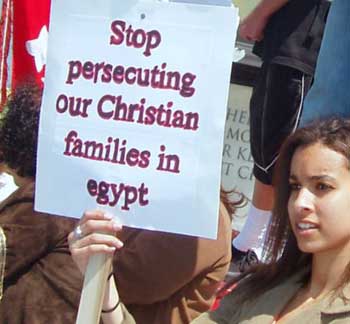The attack of a suicide bomber that took place in Alexandria, Egypt, as worshippers were gathering for a service shortly after midnight on New Year’s Eve marks a watershed event in the history of Christianity. And this not so much for its brutality or its catastrophic effects—21 people killed—as for the fact that this time, unlike the many other times, the international news media coverage is quite good and comprehensive. This is, at any rate, the biggest news, also because, unfortunately, the murders of Christians are no news at all (see here for a brief summary of how things stand in this respect).
The other news is that, although there was no immediate claim of responsibility, Egyptian analysts said that al-Qaeda, which has had little impact locally in the past, appeared to be “announcing its presence.” Last, but not least, while preparing for their traditional Christmas on Friday, Coptic Christians worldwide are on high alert and their churches in Europe and Egypt are receiving extra law enforcement protection. Also highly alarming, more precisely, is that
[t]he Mujahidin Network has threatened more attacks against Christian Copts in Egypt. The warning was addresses directly at the Copt Pope Shenouda III, announcing an “imminent attack.” Threats were published on the ‘al-Shumukh’ website, the same on which on December 2nd a list of 50 targeted Coptic churches had been published, including the Church of Two Saints in Alexandria attacked on New Year’s Eve.
Which is also no surprise, since Ahmed al-Tayyeb, the grand imam of Al-Azhar University, after condemning on Saturday the attack to the Coptic Orthodox Church of Alexandria—he spoke of “atrocious act prohibited by Islam”—had the nerve to criticize on Sunday the call of Pope Benedict XVI to the world leaders to protect the Christians, saying it was an “unacceptable interference” in Egyptian affairs—something one couldn’t ever imagine, beyond any level of tolerance. This man seems, or pretends, not to know what he should be well aware of, namely, that—as a recent study (pdf) by the Pew Forum on Religion and Public Life shows—64 nations and nearly 70 percent of the world’s 6.8 billion people have high or very high restrictions on religion, the brunt of which often falls on religious minorities, and that the Middle East-North Africa is the part of the world which has the highest government and social restrictions on religion. The worst nations include Egypt, India, Indonesia, Iran, and Pakistan. And it is no accident that four of the five are Islamic.
Yet, as I said above, a new awareness is emerging. Well, more in the media than at a policy level, but one-third of something is better than a half of nothing. Those 21 victims won’t be the last, but their sacrifice was not in vain.
